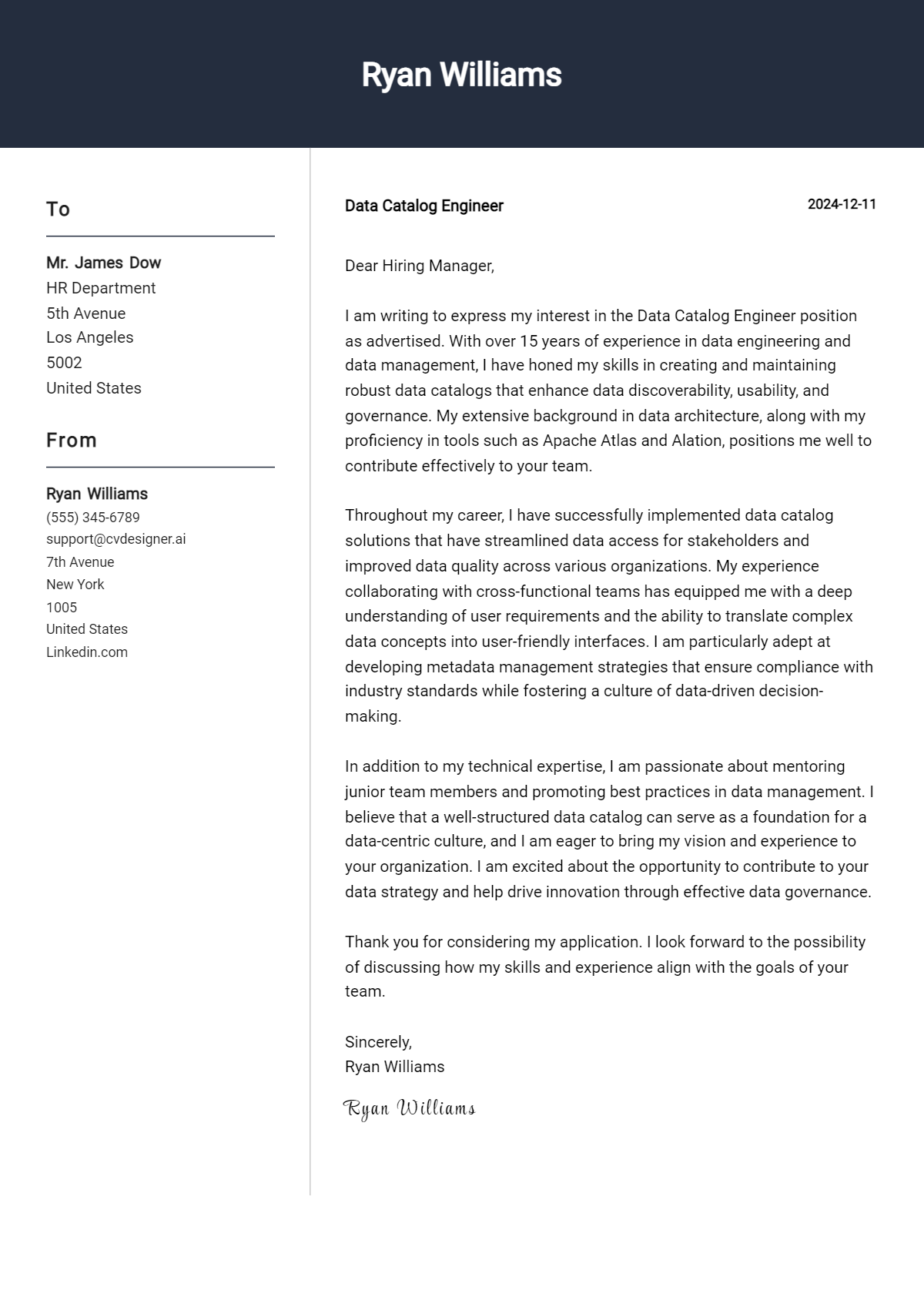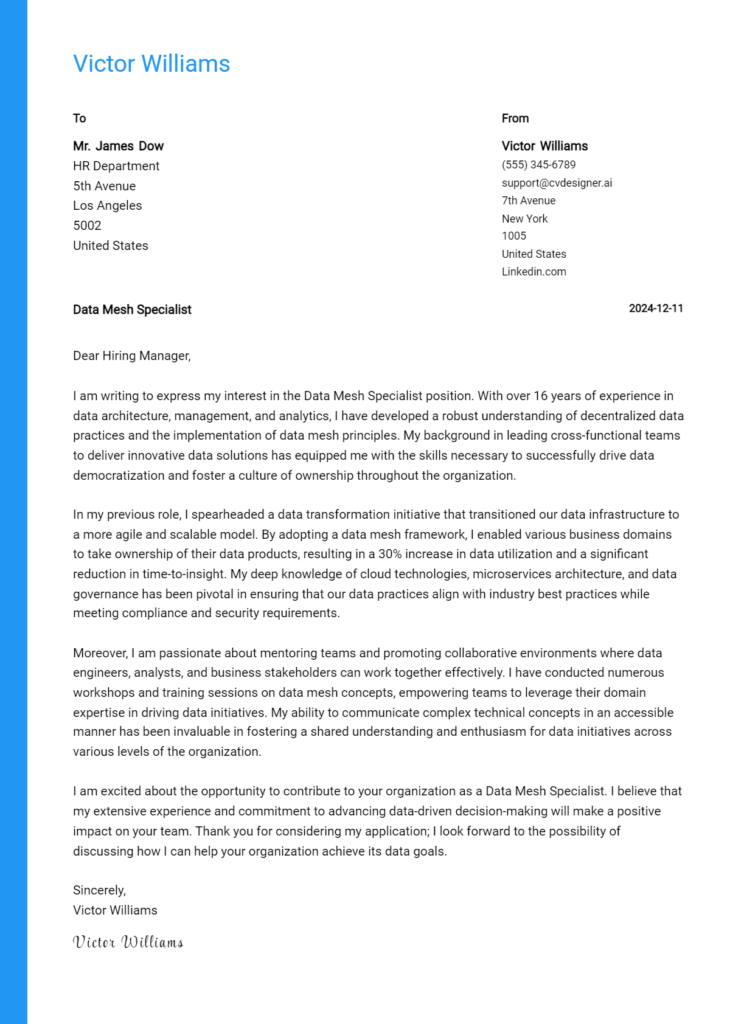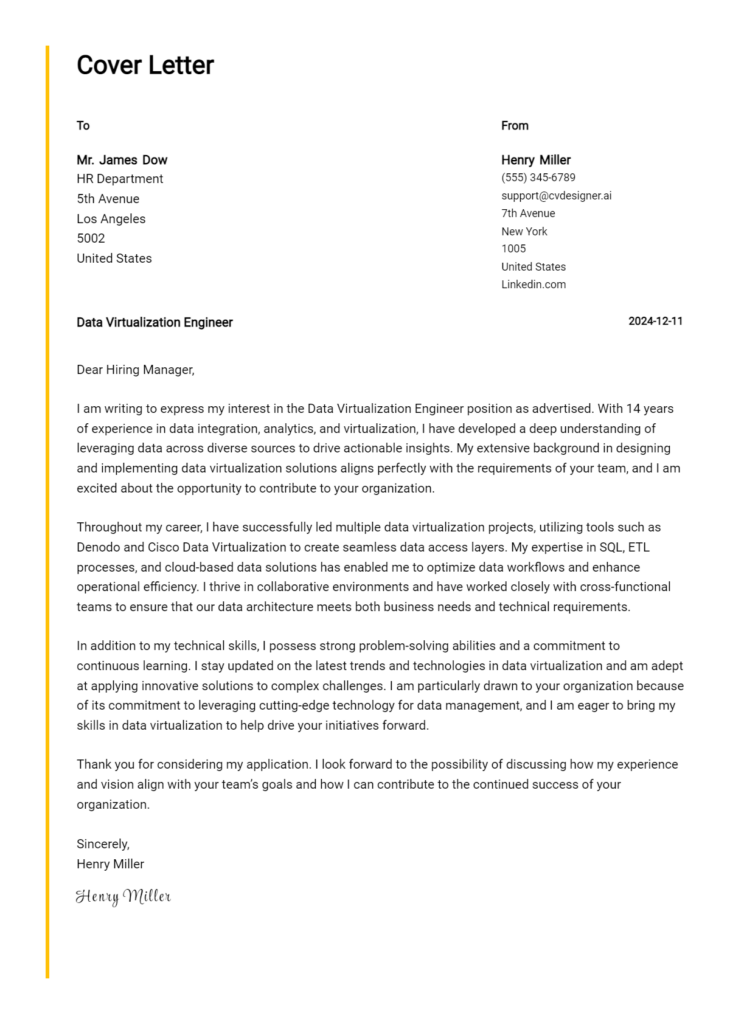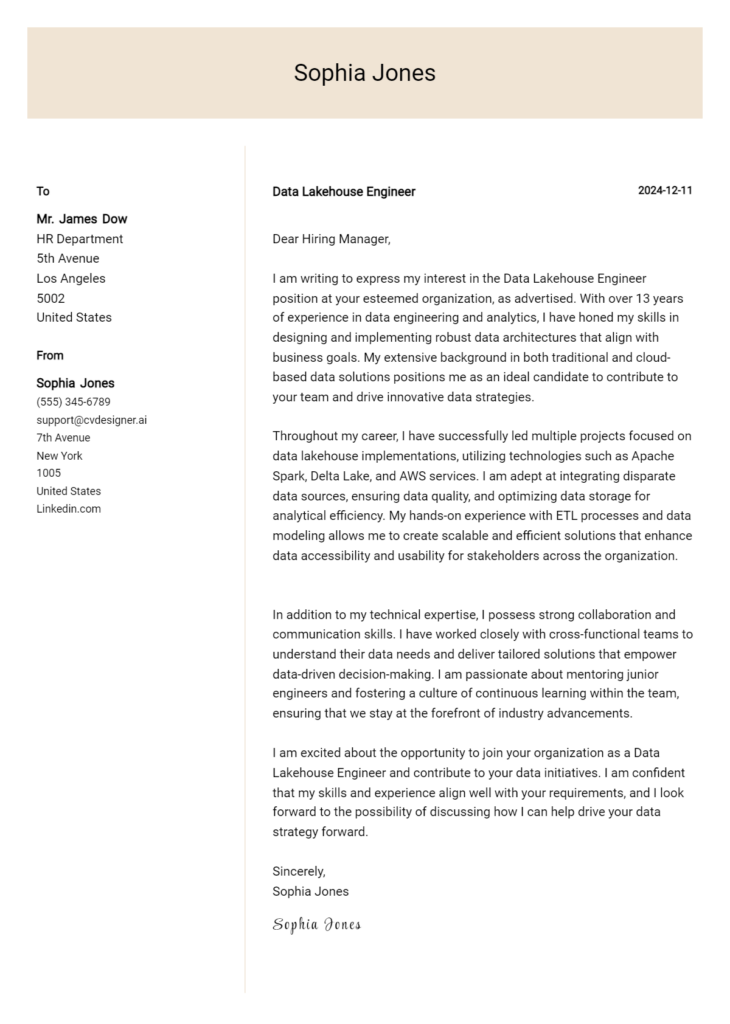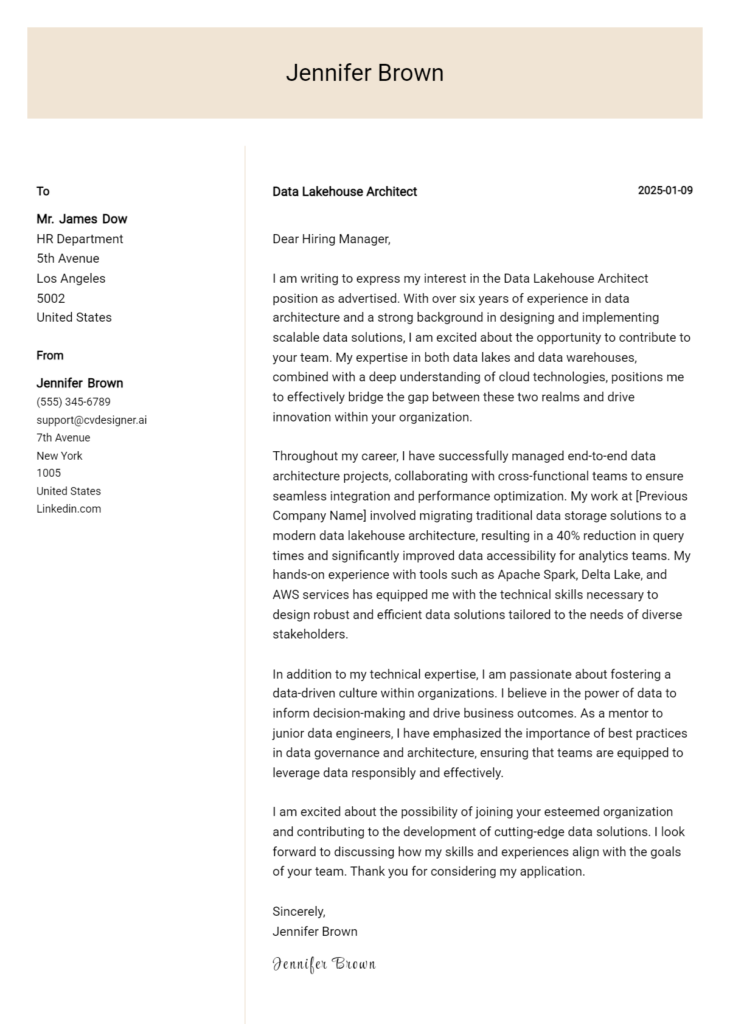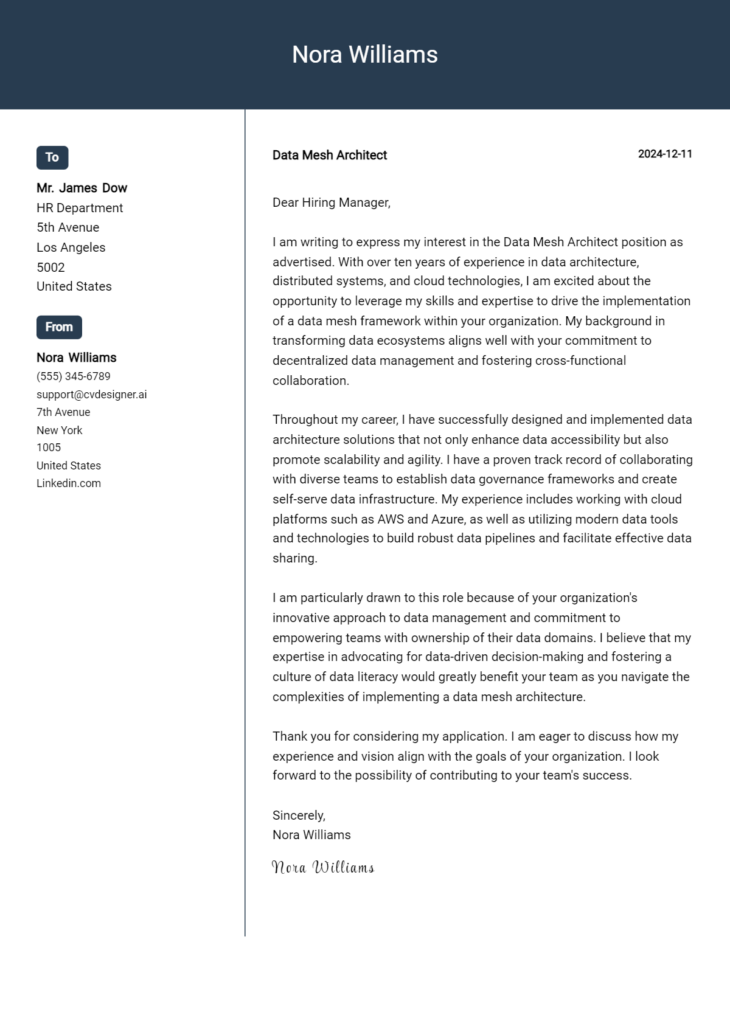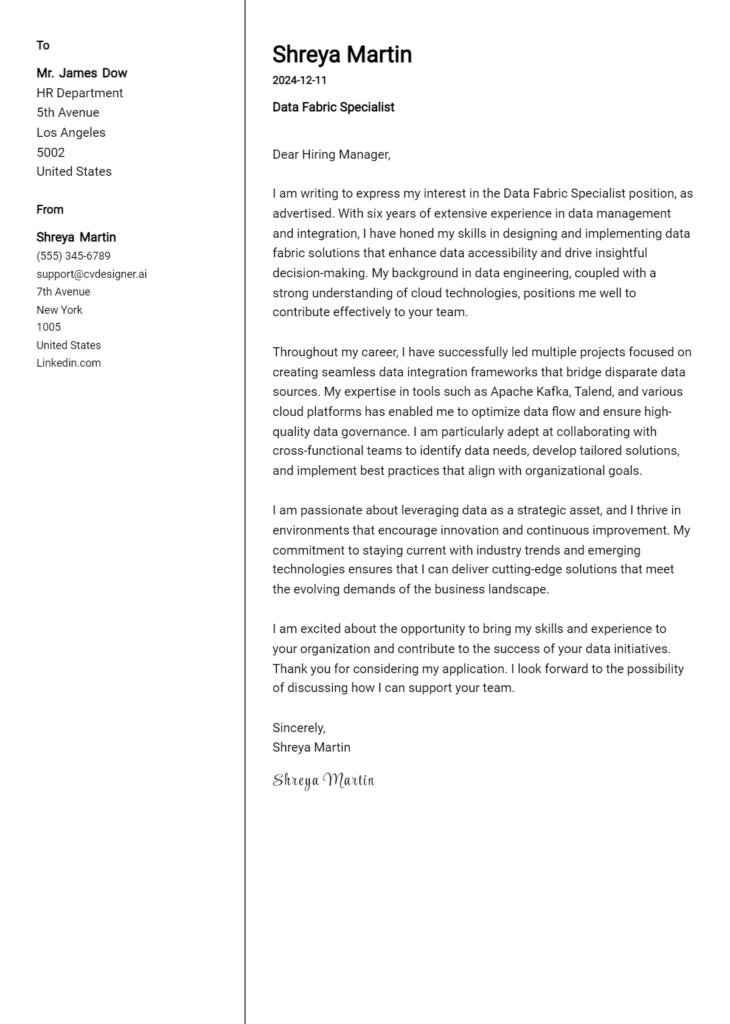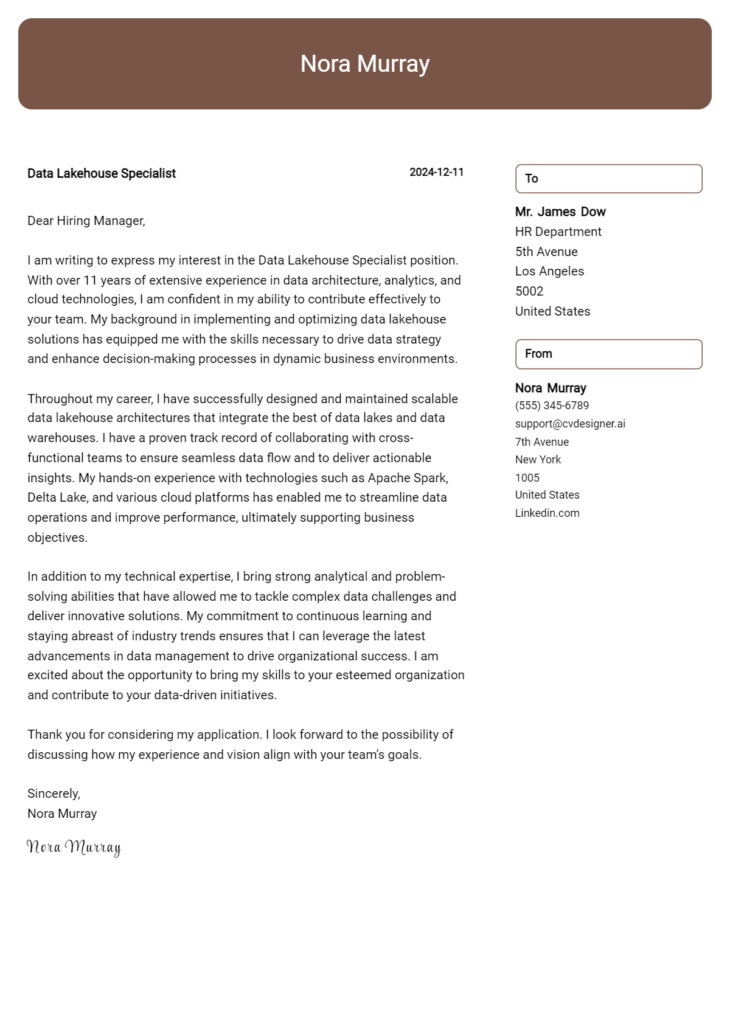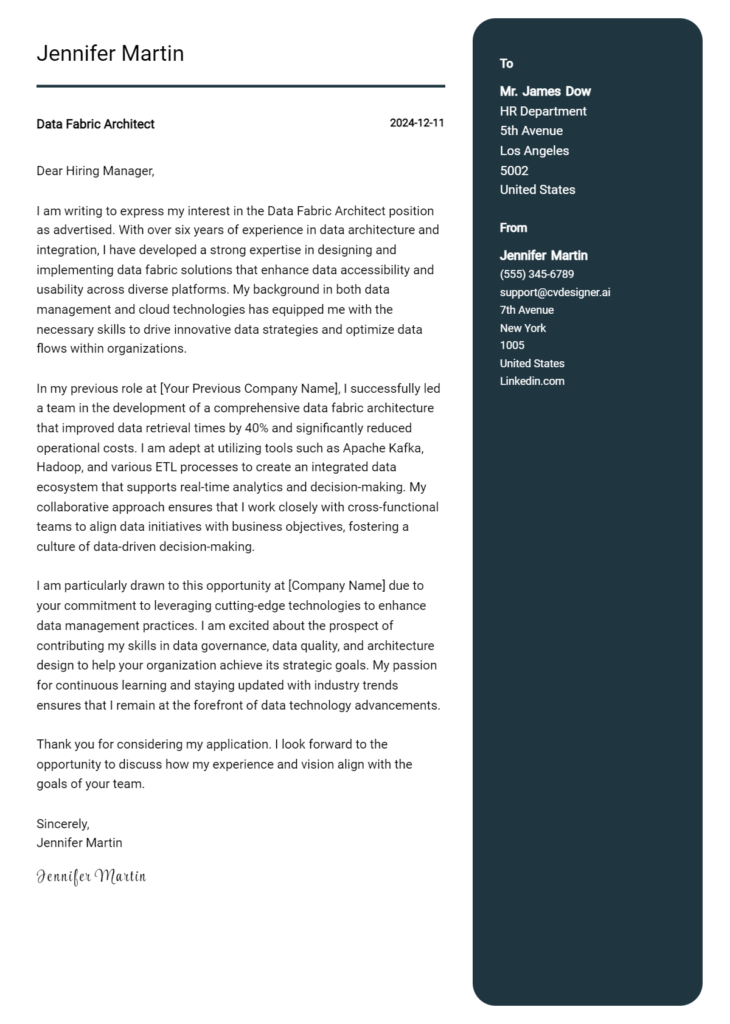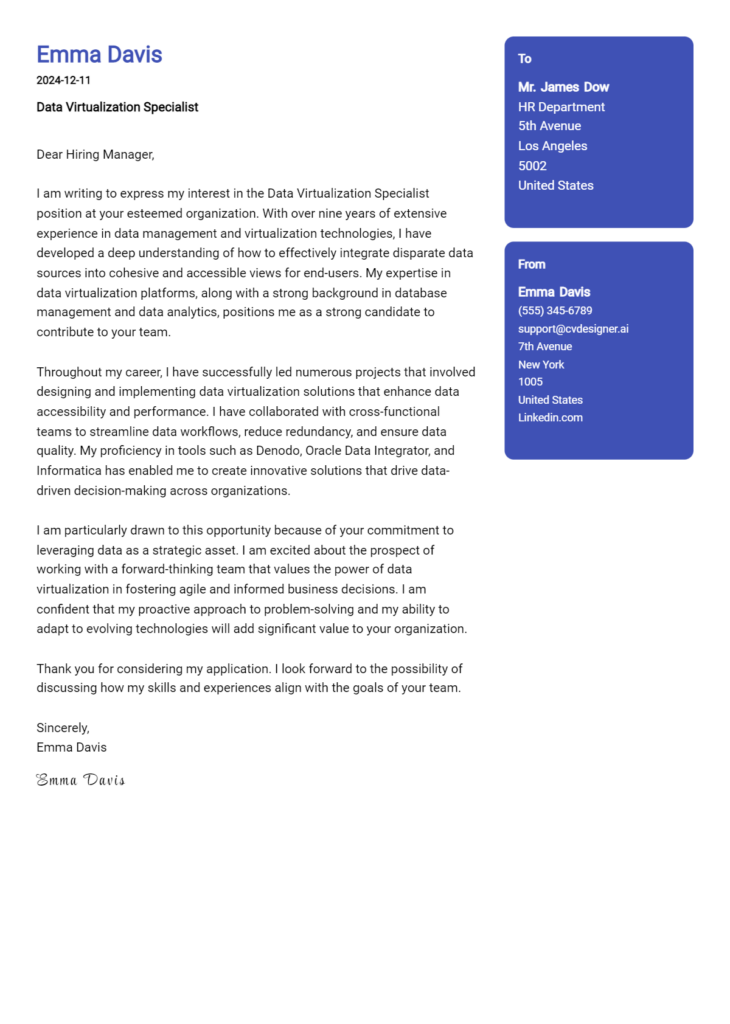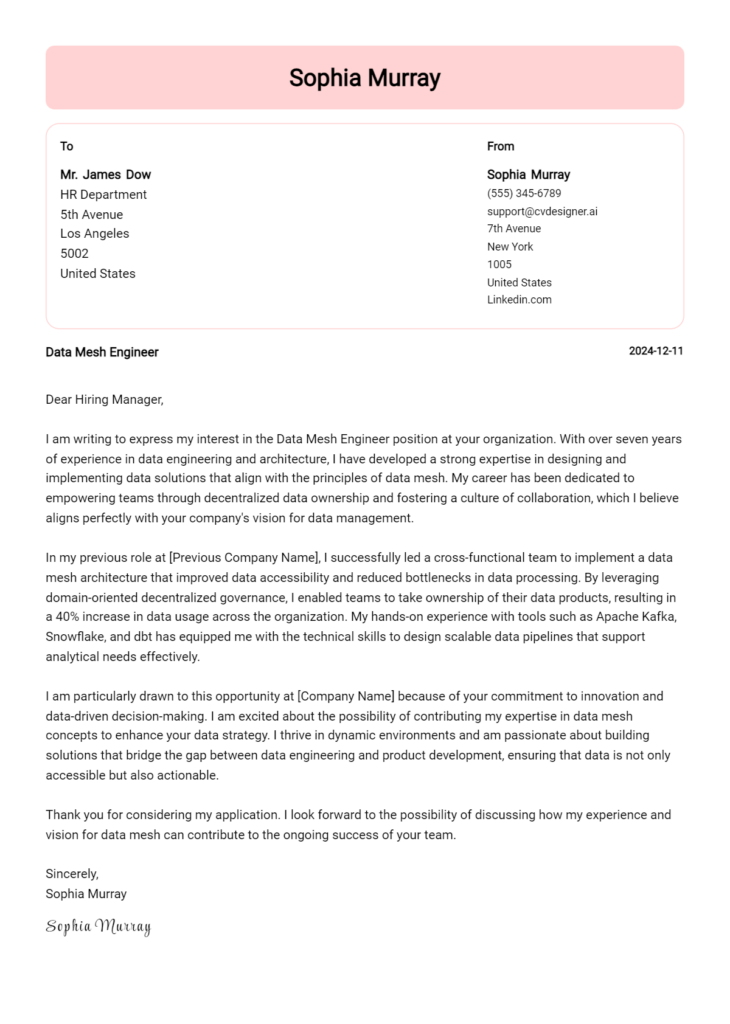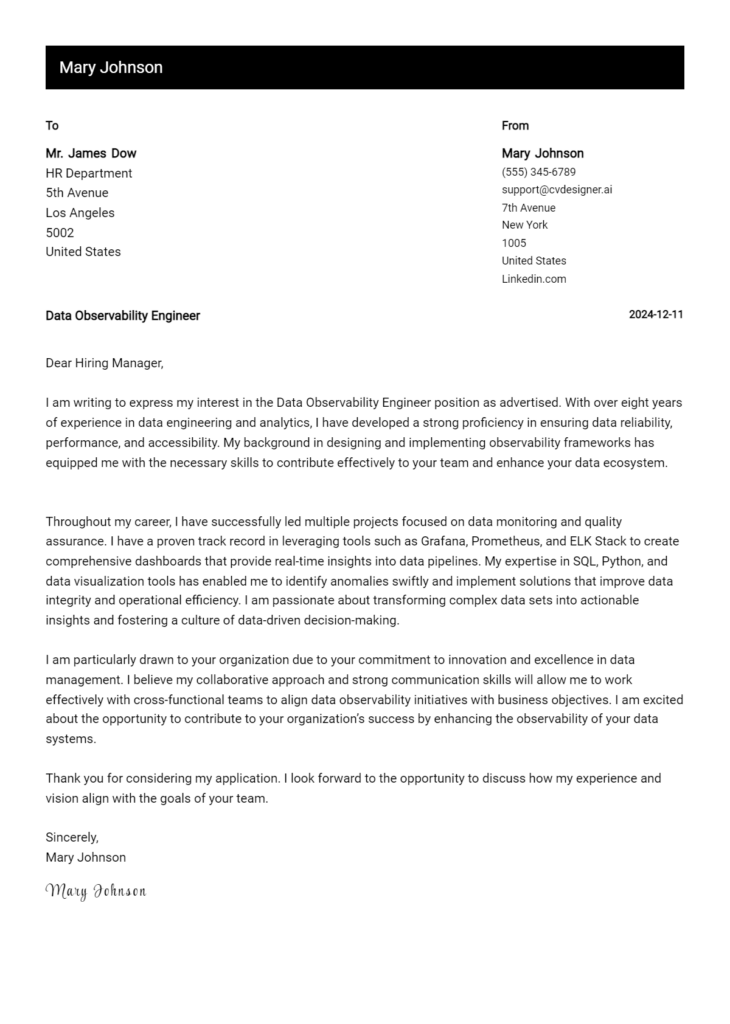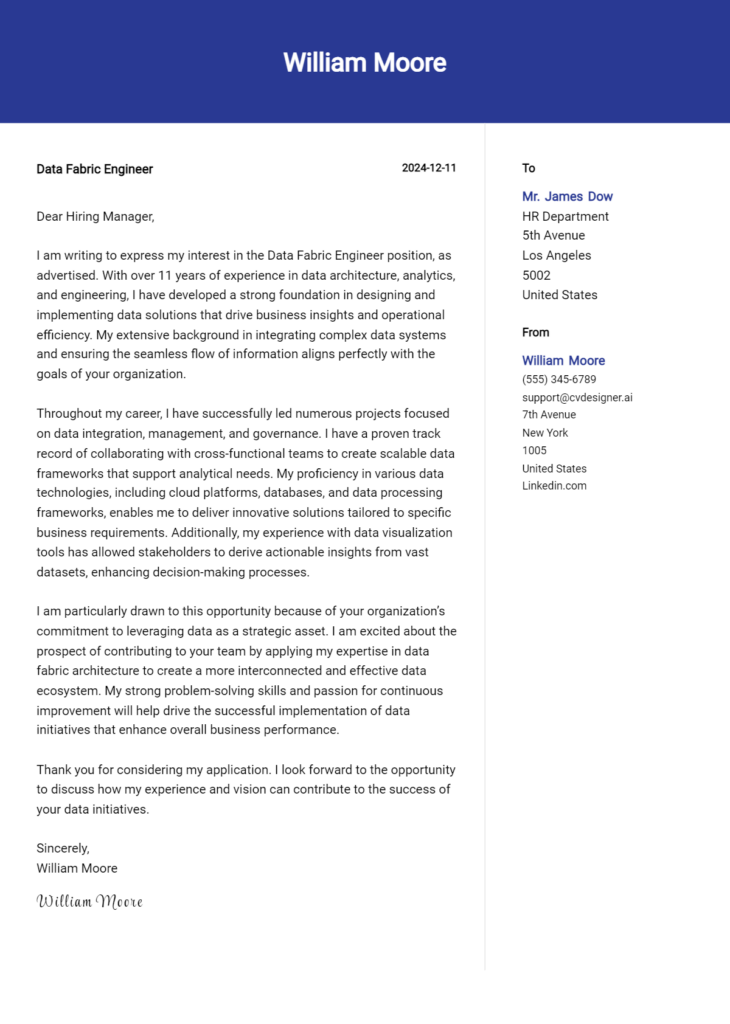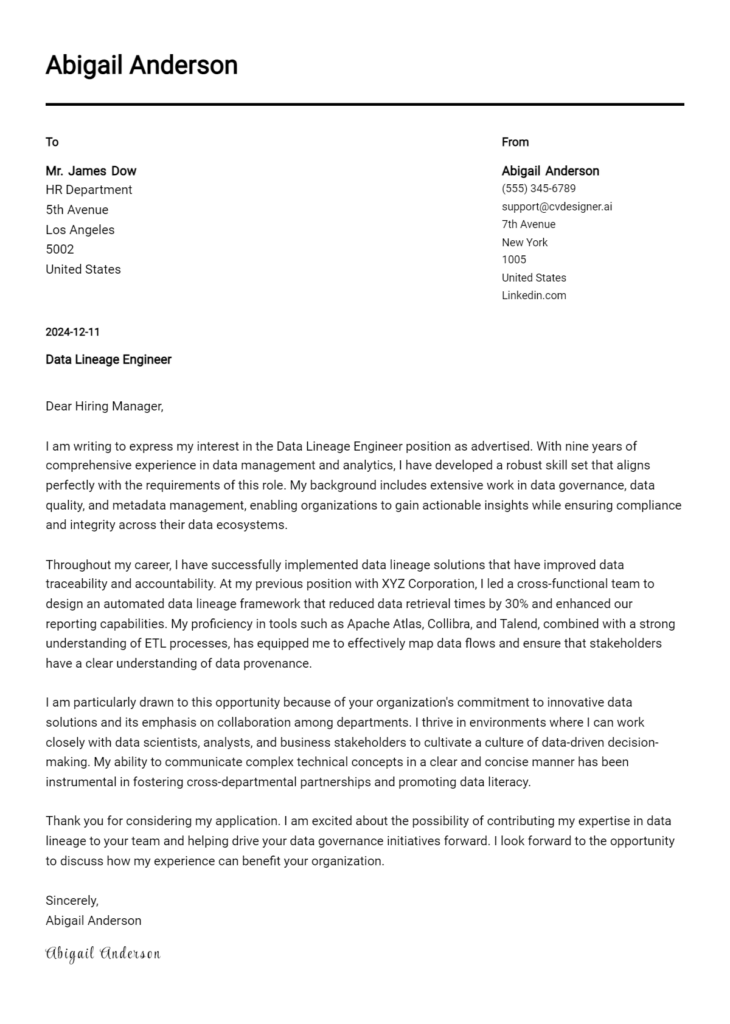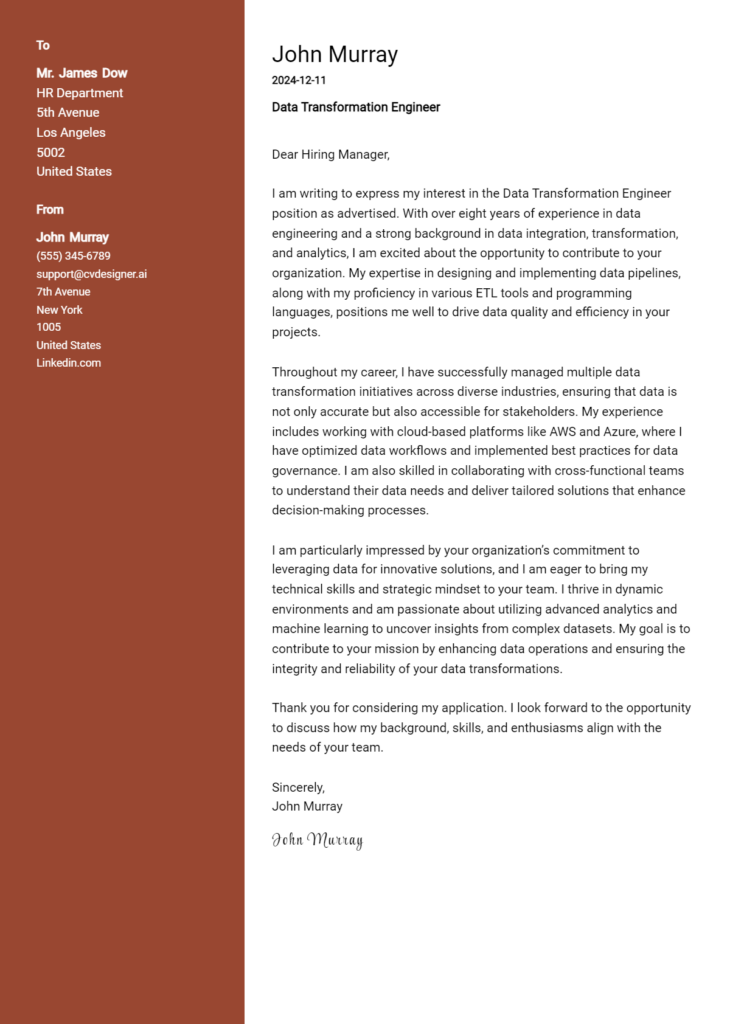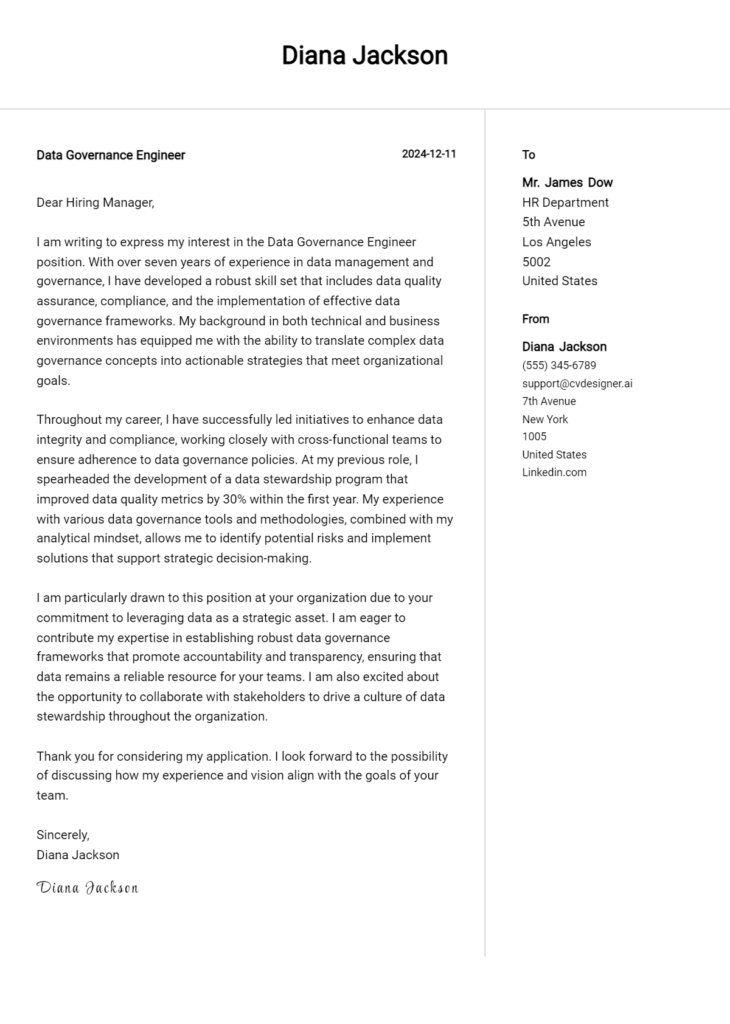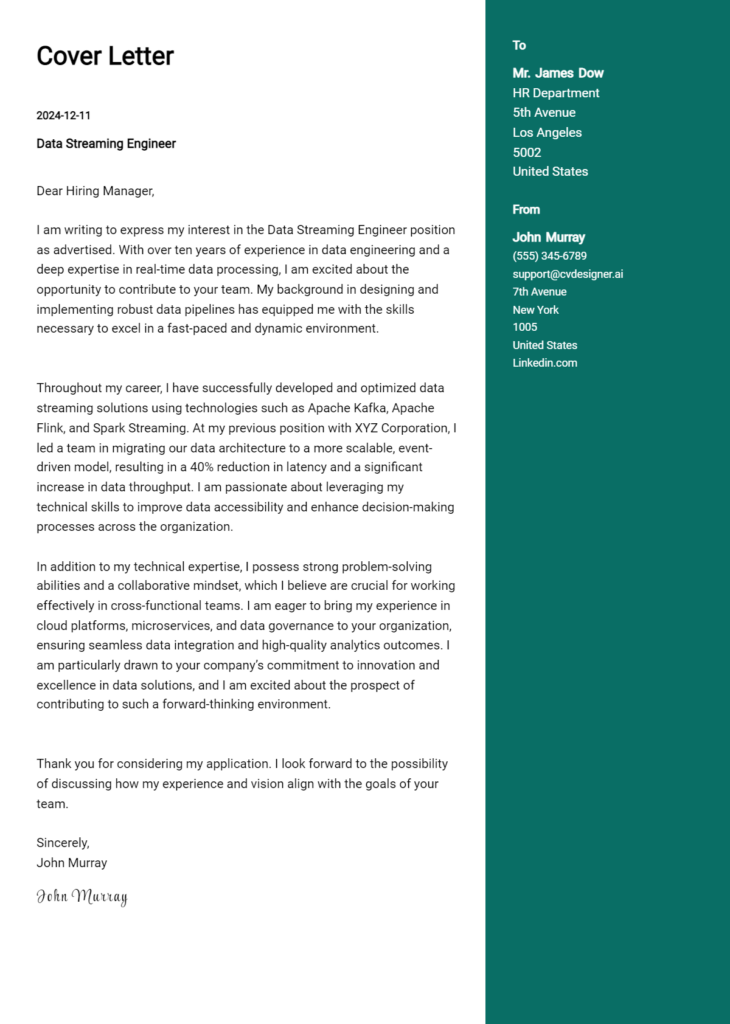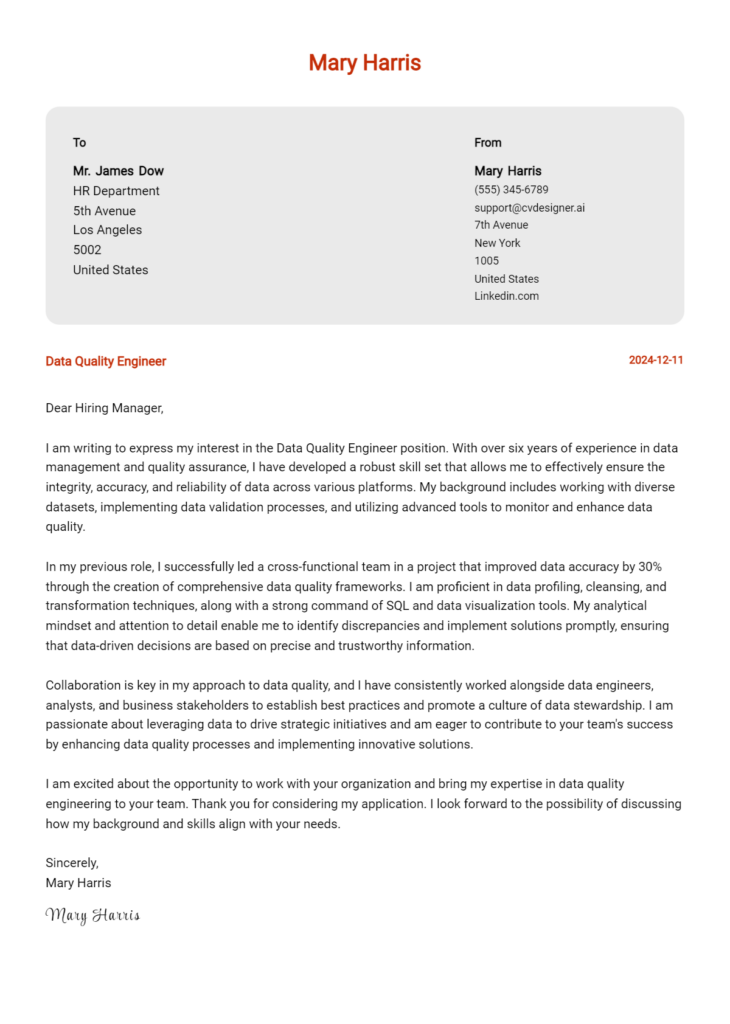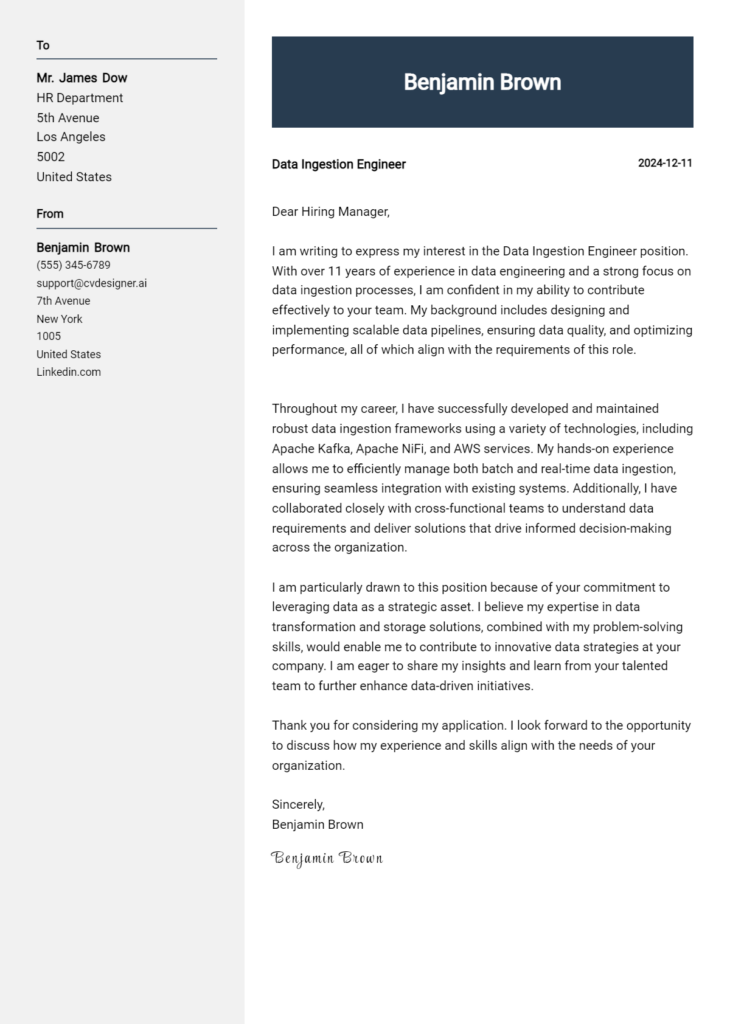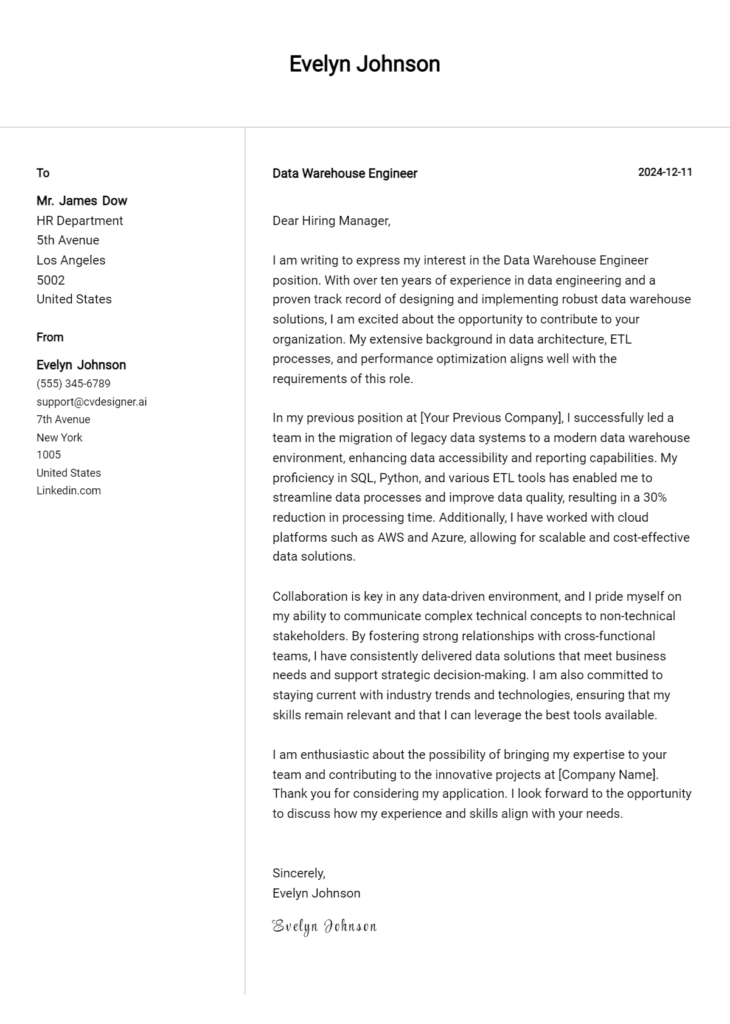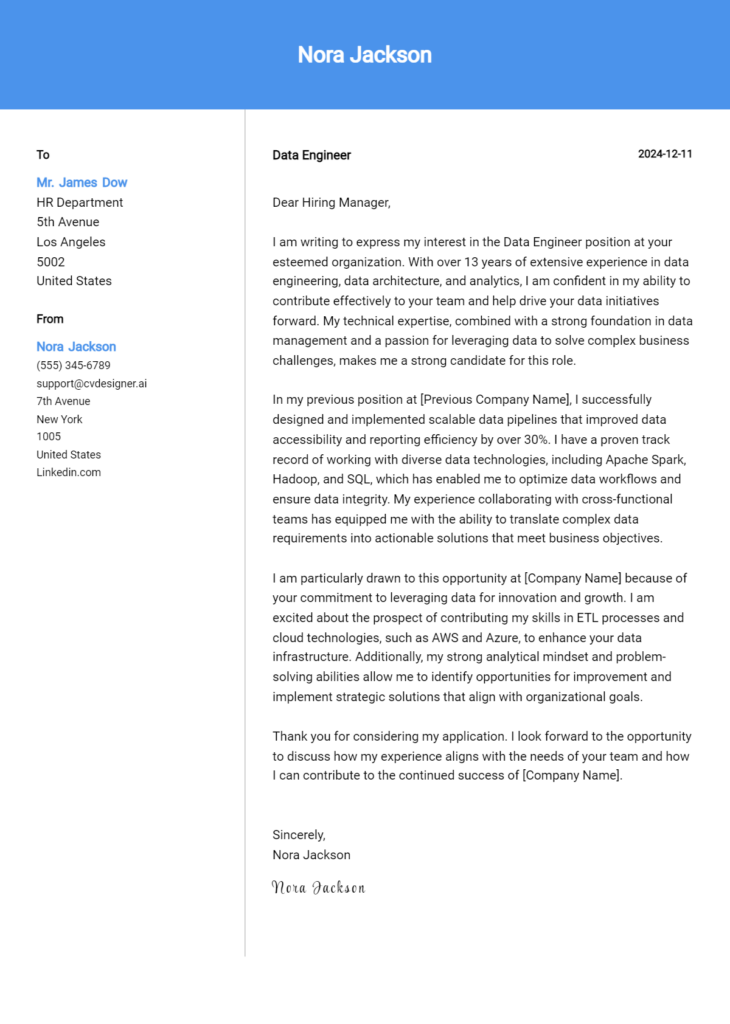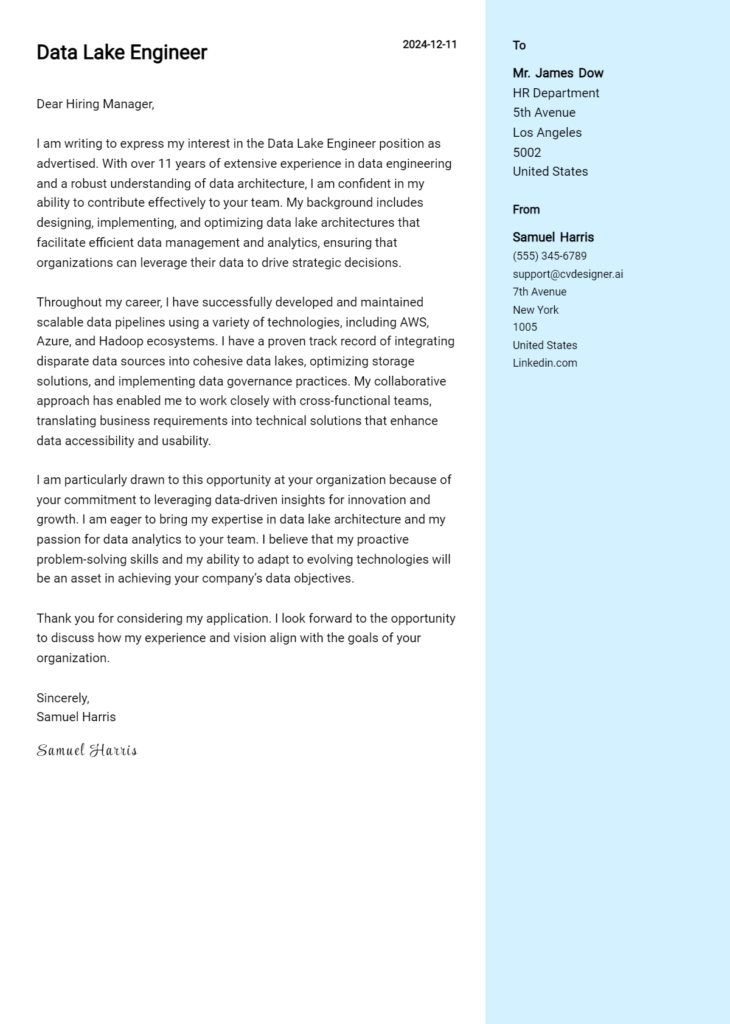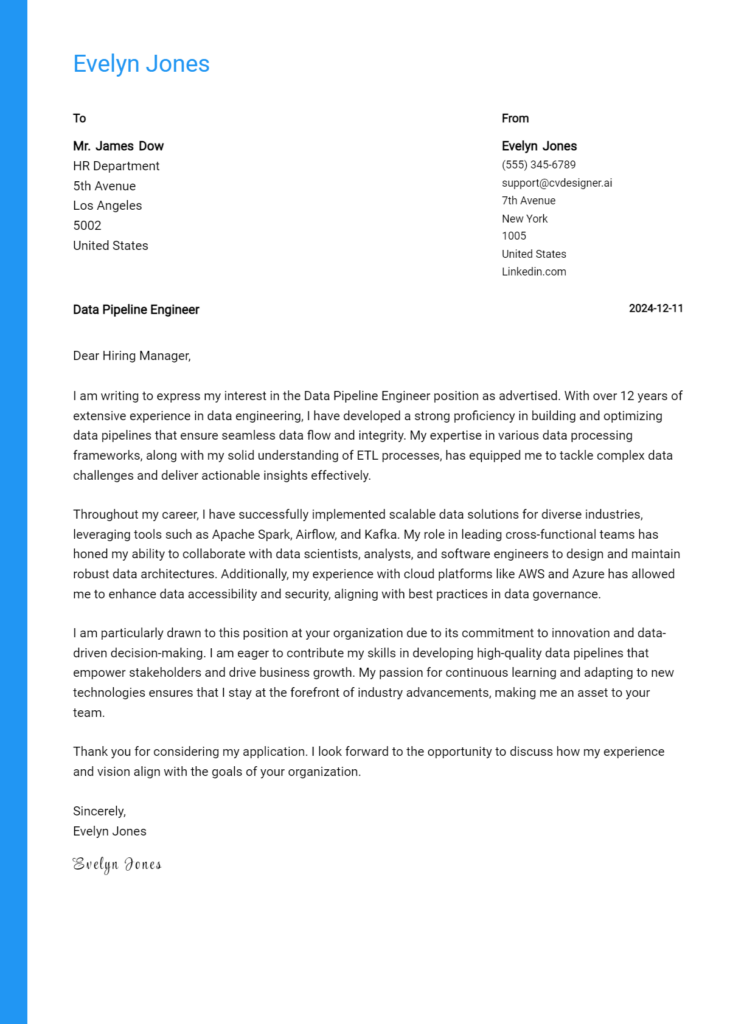Data Catalog Engineer Cover Letter Examples
Explore additional Data Catalog Engineer cover letter samples and guides and see what works for your level of experience or role.
How to Format a Data Catalog Engineer Cover Letter?
Crafting a compelling cover letter is essential for a Data Catalog Engineer, as it serves as your first impression to potential employers. The way you format your cover letter not only showcases your technical skills but also reflects your organizational abilities and attention to detail—qualities that are vital in managing data effectively. A well-structured cover letter can capture the hiring manager’s interest, demonstrating your capability to handle complex data environments and communicate effectively.
In this guide, we'll delve into the key components of a professional cover letter tailored for a Data Catalog Engineer, including:
- Cover Letter Header
- Cover Letter Greeting
- Cover Letter Introduction
- Cover Letter Body
- Cover Letter Closing
Each section is crucial in conveying your qualifications and professionalism. Let’s break down these components to help you create a standout cover letter that aligns with the demands of the role.
Importance of the Cover Letter Header for a Data Catalog Engineer
A well-structured cover letter header is crucial for a Data Catalog Engineer as it sets the tone for the professional presentation of your application. It should include essential contact information, the date, and the recipient's details, ensuring clarity and professionalism. A clear header not only helps the hiring manager identify your application but also reflects your attention to detail—a key trait for a Data Catalog Engineer responsible for managing data assets. Below are examples of strong and weak cover letter headers that illustrate the importance of format and clarity.
Strong Example
John Doe 123 Data St. Data City, DC 12345 (123) 456-7890 john.doe@email.com October 30, 2023 Hiring Manager XYZ Data Solutions 456 Analytics Ave. Data City, DC 12345
Weak Example
John D. 10/30/23 XYZ Company
The Importance of a Cover Letter Greeting for a Data Catalog Engineer
The greeting of your cover letter serves as the first impression you make on a potential employer, setting the tone for the entire document. A well-crafted greeting not only demonstrates professionalism but also shows that you have taken the time to personalize your application. Addressing the hiring manager directly can create a connection and convey your enthusiasm for the position. To avoid generic greetings like "To Whom It May Concern," it's crucial to research the recipient's name, which can often be found on the company website or through LinkedIn. A personalized greeting indicates that you are genuinely interested in the role and the organization.
Strong Greeting Example
Dear Mr. Johnson,
Weak Greeting Example
To Whom It May Concern,
The Importance of a Strong Cover Letter Introduction for a Data Catalog Engineer
A well-crafted cover letter introduction is crucial for a Data Catalog Engineer as it serves as the first impression to the hiring manager. This opening paragraph should not only capture attention but also convey the candidate's enthusiasm for the role. By briefly highlighting relevant skills or notable achievements, the candidate can set the tone for the rest of the letter, demonstrating their alignment with the job requirements. A compelling introduction can be the difference between a resume being considered or overlooked, making it essential to get it right.
Strong Example
Dear [Hiring Manager's Name], I am excited to apply for the Data Catalog Engineer position at [Company Name], as I believe my extensive experience in data management and cataloging aligns perfectly with your needs. With over five years of hands-on experience in implementing data catalog solutions and a proven track record of enhancing data discoverability and governance for Fortune 500 companies, I am eager to bring my skills to your innovative team. My passion for transforming complex data into actionable insights fuels my desire to help [Company Name] maximize its data assets.
Weak Example
To Whom It May Concern, I am writing to apply for the Data Catalog Engineer job. I have some experience with data and think I could do the job. My resume is attached, and I hope you consider me.
Purpose of the Cover Letter Body for a Data Catalog Engineer
The body of a cover letter for a Data Catalog Engineer is crucial because it provides an opportunity for candidates to articulate their relevant skills, experiences, and the unique value they can bring to the organization. This section should effectively highlight specific projects and accomplishments that demonstrate their proficiency in data management, cataloging, and metadata strategies. By detailing successful projects, such as the implementation of a data catalog tool that improved data discoverability by 30%, candidates can vividly illustrate their impact on previous employers. This not only showcases their technical abilities but also their understanding of the business implications of data management, making a compelling case for their fit within the company.
Strong Example
Dear [Hiring Manager's Name], I am excited to apply for the Data Catalog Engineer position at [Company Name]. In my previous role at [Previous Company], I led a project to implement a comprehensive data cataloging solution that resulted in a 40% reduction in data retrieval times for business users. By collaborating with cross-functional teams, I successfully integrated metadata management practices that enhanced data governance and compliance across the organization. My experience with tools such as Apache Atlas and Alation, combined with my expertise in SQL and data modeling, positions me to contribute effectively to your team and help [Company Name] maximize the value of its data assets. Sincerely, [Your Name]
Weak Example
Dear [Hiring Manager's Name], I am writing to express my interest in the Data Catalog Engineer position at [Company Name]. I have worked with various data tools and have some experience in data management. I believe I can help your company with its data needs. I have done some projects, but I can't remember the details right now. I am eager to learn and hope to contribute to your team. Best, [Your Name]
Importance of the Cover Letter Closing for a Data Catalog Engineer
The closing paragraph of a cover letter is crucial as it serves to summarize your qualifications, reinforce your enthusiasm for the Data Catalog Engineer position, and prompt the hiring manager to take the next step, whether that be reviewing your resume or scheduling an interview. A strong closing leaves a lasting impression and demonstrates your professionalism and proactive attitude, while a weak closing can diminish the overall impact of your application.
Strong Example
Thank you for considering my application for the Data Catalog Engineer position at [Company Name]. With my extensive experience in data management, metadata strategy, and a passion for enhancing data accessibility, I am excited about the opportunity to contribute to your team. I look forward to the possibility of discussing how my skills align with the needs of your organization. Please feel free to review my resume for further details, and I would welcome the chance to schedule an interview at your convenience.
Weak Example
Thanks for reading my letter. I hope you look at my resume. I guess I would like to talk about the job if you want to.
These tips will assist candidates in crafting an impactful cover letter for the Data Catalog Engineer position. A well-written cover letter is crucial in highlighting your technical skills, problem-solving capabilities, understanding of the Software Development Life Cycle (SDLC), ability to work collaboratively in a team, and a commitment to continuous learning. By emphasizing these attributes, you can effectively convey your suitability for the role.
Tips for Crafting an Effective Cover Letter
Showcase Your Technical Skills: Clearly articulate your proficiency in data cataloging tools and technologies such as Apache Atlas, Alation, or Informatica. Mention specific programming languages or data management frameworks you are familiar with, as this demonstrates your technical expertise and readiness to tackle the responsibilities of the role.
Highlight Problem-Solving Abilities: Provide examples of past experiences where you successfully identified and resolved data-related issues. Illustrating your analytical thinking and troubleshooting skills will help potential employers see your capability in managing complex data environments.
Demonstrate SDLC Knowledge: Explain your familiarity with the Software Development Life Cycle and how it applies to data management projects. Discuss your experience in different phases of the SDLC, such as requirements gathering, design, implementation, testing, and maintenance, to show your comprehensive understanding of the processes involved.
Emphasize Teamwork: Discuss your experience working in cross-functional teams. Highlight how your collaboration with data scientists, analysts, and other stakeholders has led to successful project outcomes. This demonstrates your ability to communicate effectively and work harmoniously within a team setting.
Express a Passion for Continuous Learning: Convey your commitment to staying updated on industry trends, emerging technologies, and best practices in data cataloging. Mention any relevant certifications, courses, or workshops you have completed or are pursuing. This indicates to employers that you are proactive and dedicated to professional growth.
For additional resources, consider exploring cover letter templates or utilizing a cover letter builder to enhance your cover letter's effectiveness.
Common Mistakes to Avoid in a Data Catalog Engineer Cover Letter
Crafting a compelling cover letter is essential for making a strong first impression as a Data Catalog Engineer. Avoiding common mistakes can significantly enhance your chances of landing an interview. Here are some pitfalls to steer clear of:
Generic Content: Using a one-size-fits-all approach can turn off hiring managers. Instead, tailor your cover letter to the specific job and company by incorporating relevant keywords and demonstrating your understanding of their data catalog needs.
Lack of Specific Examples: Failing to provide concrete examples of your past achievements can weaken your application. Use quantifiable metrics to showcase your contributions in previous roles, such as improved data accessibility or enhanced metadata management.
Ignoring the Format: Neglecting the proper cover letter format can make your application look unprofessional. Adhere to a clear structure with an introduction, body, and conclusion, and refer to guidelines on cover letter format to ensure clarity.
Typos and Grammatical Errors: Spelling and grammar mistakes can undermine your credibility. Always proofread your cover letter or use tools to catch errors before submission.
Overly Technical Language: While you may be well-versed in data cataloging terminology, using excessive jargon can alienate your reader. Aim for clarity and ensure your cover letter is accessible to a broader audience, including HR personnel.
Neglecting to Address the Hiring Manager: Failing to personalize your salutation can make your cover letter feel impersonal. Whenever possible, address it to the specific hiring manager to create a more engaging introduction.
Not Highlighting Soft Skills: Technical prowess is vital, but soft skills like collaboration and communication are equally important in a Data Catalog Engineer role. Make sure to highlight these qualities to show that you’re a well-rounded candidate.
By being mindful of these common mistakes, you can create a dynamic cover letter that stands out. For additional inspiration, check out various cover letter examples to help you craft your own.
Cover Letter FAQs for Data Catalog Engineer
What should I include in my cover letter for a Data Catalog Engineer position?
In your cover letter, highlight your technical skills relevant to data cataloging, including experience with metadata management, data governance, and data modeling tools. Discuss your familiarity with data cataloging platforms like Alation, Collibra, or AWS Glue. Additionally, mention your analytical skills and ability to collaborate with data engineers, data scientists, and business stakeholders. Share specific examples of how you've implemented data catalogs in previous roles, emphasizing the impact on data accessibility and usability. Finally, express your enthusiasm for the role and the organization, demonstrating your alignment with their values and objectives.
How can I demonstrate my technical expertise in my cover letter?
To showcase your technical expertise, include specific projects or experiences where you utilized data cataloging tools and methodologies. You might describe a project where you developed a metadata repository, detailing the tools you used and the outcomes achieved. Mention any relevant certifications, such as those in data management or specific data catalog platforms. Additionally, discussing your familiarity with data governance frameworks and compliance standards can demonstrate your understanding of the broader context of data management. Use quantifiable results, such as improved data retrieval times or enhanced data quality, to further substantiate your expertise.
Should I tailor my cover letter for each application?
Absolutely! Tailoring your cover letter for each application is essential. Research the company and the specific job description to identify the skills and experiences they prioritize. Use this information to customize your cover letter, emphasizing the most relevant aspects of your background that align with their requirements. Additionally, if the company has a particular focus, such as data privacy or cloud technologies, mention your experiences in those areas. A tailored cover letter not only shows your attention to detail but also demonstrates your genuine interest in the role and the organization, making you a more compelling candidate.
How do I address gaps in my experience in a cover letter?
If you have gaps in your experience, use your cover letter to frame them positively. Focus on transferable skills and relevant experiences that showcase your capabilities as a Data Catalog Engineer. For example, if you lacked direct experience with a specific tool, mention similar tools you've worked with, emphasizing your ability to learn quickly. Additionally, discuss any relevant coursework, online training, or self-directed projects that demonstrate your commitment to professional development. You can also highlight your soft skills, such as problem-solving and collaboration, which are essential in data cataloging roles. Being honest while focusing on your strengths can help alleviate concerns about gaps in your experience.
Build your Cover Letter in minutes
Use an AI-powered cover letter builder and have your letter done in 5 minutes. Just select your template and our software will guide you through the process.

